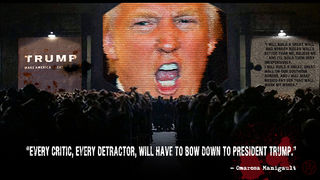President Donald Trump
How Trump is Improving (and Ruining) Science Fiction
Trump is Making Science Fiction More Relevant (and Less Believable)
Posted May 26, 2018
It seems nothing is more popular than Science-Fiction right now. From Star Wars, to The Avengers, to The Handmaid’s Tale—nothing is bringing in more money or sparking more conversation. That's one reason I did my newest course for The Great Courses, “Sci-Phi: Science Fiction as Philosophy.” Indeed, it seems that what science fiction does best is philosophy.
One might even argue that the earliest sci-fi tales were told by philosophers to illustrate philosophical concepts or make philosophical arguments. Take Plato’s story about the Ring of Gyges--a ring that makes its wearer invisible. The questions it raises about whether one should bother being moral motivates the entire conversation of Plato’s Republic. Or take Plato’s cave allegory, that imagines a group of people fooled into thinking shadows are real. Plato uses it to make a point about the value of knowledge (and also to inspire the 1999 sci-fi blockbuster, The Matrix). There’s Descartes wondering if he’s being fooled by an evil demon, Hobbes and Rousseau’s ponderings about the state of nature, Laplace’s calculating demon, Rawls' original position…I could go on and on.
Of course, although you could call them speculative fiction, because some of these stories don’t involve the usual sci-fi tropes, you might not call them sci-fi. Ok, fine. But the list doesn’t stop there. There’s A True History, by the 2nd century Syrian philosopher Lucian of Samosata, that involves a trip to the moon (which is populated by an all-male society, giant birds, and cloud centaurs) and was intended to satirize the sophists. In the 1200’s, Islamic philosopher Ibn al-Nafis told a story about a spontaneously created man, that envisioned something like cloning, to argue that Islam was compatible with empirical observation. The philosopher Thomas More wrote the first “utopian story” (Utopia) in 1515, and the philosopher Francis Bacon wrote The New Atlantis (which had submarines and microscopes) about a century later—both of which served as social commentary. And in 1705, Daniel Defoe used The Consolidator to poke fun at the politics and religion of his day. Again, I could go on and on.
But I raise these examples because, not only do they predate what is often considered the first work of science-fiction (Mary Shelley’s Frankenstein), but all these stories were written to make a philosophical point. So science fiction not only arose out of philosophy, but what science fiction does best is philosophy.

How Sci-fi Can Change Us
In my view, the best way science fiction does this today is by telling us a story that tricks us into divorcing ourselves from our preconceptions and emotional biases. Since we don’t have any “skin in the game” so to speak, we evaluate the story without prejudice. As a result, we’ll draw an impartial conclusion about the story, only to later realize that the story is analogous to something that’s happening in the real world. This can force to realize that our conclusion about the real-world situation is biased and reevaluate it.
As Lucasfilm’s Chief Creative Officer John Knoll once put it:
[T]he best science fiction gives you an opportunity to explore philosophical and moral themes. There are often societal problems that are very emotionally loaded … [but] if you … recast them in a science fiction setting, [and are thus] looking at a more novel situation, then you can leave some of those preconceived notions behind and … reevaluat[e] it anew. [This] may cause you to rethink your position on the terrestrial version of that problem.”
Indeed, Star Wars does exactly this. Emperor Sheev Palatine in Star Wars is obviously supposed to be evil, but the false war on false pretenses into which he drew The Republic, and the way he used it as an excuse to reorganize The Republic into The First Galactic Empire, is very similar to the false Iraq war that George W. Bush dragged us into (on false pretenses about weapons of mass destruction) and The Patriot Act. The Emperor and Bush even used some of the same “safety and security” language. Although it was one of the loathed prequels, watching Episode III: Revenge of the Sith in 2005 could have caused one to rethink one’s support for Bush and his policies.

How Trump is Improving Science Fiction
Of course, the similarity between President Bush and Sheev Palatine was likely intentional (although the Sheev was originally based on Nixon); Lucas wrote Episode III during the Bush administration and the Iraq War. But many such similarities in science-fiction are not intentional. Indeed, many past pieces of science fiction have become newly relevant in Trump's America--and that brings me to how Trump is improving science fiction.
Take 1984 and Fahrenheit 451. They are set in world in which books are banned and burned by the government and where the free press is suppressed (or controlled). Huh. Trump has called for the banning of books (like Michael Wolf’s Fire and Fury) and continually vilifies and calls for the suppression of the free press (like the “failing New York Times”). He's even said that he wants to open up the U.S. libel laws so he can sue them into silence. Indeed, Trump’s brazen disregard for the truth, gaslighting, propensity to continually lie, and Kelly Ann Conway’s excusing it away as “alternative facts” has been likened to 1984’s “newspeak” and “doublethink.” They are used in the novel by “Big Brother” to control the beliefs of the populace in the same way that “alternative facts” and “fake news” are used by the Trump administration for the same purpose. We might even compare Fox News (and certainly the “Trump News Channel”) to 1984’s Ministry of Truth. It’s no coincidence that 1984 skyrocketed to the top of Amazon’s best seller list after Trump’s election, and that Fahrenheit 451 is being remade by HBO. They are more relevant than ever.
And speaking of 1984--that's the year that Margret Atwood was writing her novel The Handmaid’s Tale. It depicts the the Republic of Gilead--an oppressive fascist regime run by religious zealots who have outlawed homosexuality, pornography, and abortion and punish violators of these laws with public hangings. They've made it illegal for women to have a job or own property, and relegate the role of women to serving men in the home. Huh. There are people in Trump's White House who actually endorse some of these views and would vote for such laws. This is why Michelle Wolf said that Mike Pence would love Hulu's TV adaptation of the novel. Interestingly, Hulu began production on the series before the election of Trump and Pence, but it's release after their election made it relevant in a way that not even Atwood could have anticipated.

Some Non-Sci-Fi Examples
In fact, all kinds of stories are becoming more relevant thanks to Trump. Ingersoll Lockwood’s late 1800s novels about the adventures of (no joke) Baron Trump have a number of eerie similarities with the real world. They include an angry mob of socialists and anarchists who, after a corrupt presidential election, threaten to tear down a building in New York City, where Trump Tower stands today.
In 1935, Sinclair Lewis’s “It Can’t Happen Here” featured an antagonist named Windrip that won the 1936 presidential election by fearmongering, appealing to populism, taking advantage of people’s economic worries, and a harsh anti-Mexican foreign policy. His followers even ignore his constant lies because he supposedly tells it like is it. “If Windrip contradicts himself, backtracks on policy or simply spews out a torrent of lies, [it doesn’t matter,] he tells them what they want to hear.” He even has his own Fox News: the papers of William Randolph Hearst, and real life newspaper owner who was famous for "yellow journalism." Once elected, Windrip uses he government to enrich himself, rounds up immigrants, discredits his dissenters—the list of similarities with Trump goes on.
In 1958, an episode of the western Trackdown (a show about the Texas Rangers) told the story of a con man/snake oil salesman named (again, no joke) Walter Trump, who convinces a town that the end of the world is coming but that he alone can protect them by (again, no joke) building a wall. “I am the only one. Trust me," he says. "I can build a wall around your homes that nothing can penetrate.” He even threatens to sue the Texas Ranger who sees through his con, for calling him a conman--just like Trump.
Again, the list goes on: The film Idiocracy and David Foster Wallace’s novel Infinite Jest both feature “entertainer presidents” that act like Trump. Biff from Back to the Future II (who was elected major and then ruined the town of Hill Valley) was actually based on Trump. And The Simpsons predicted a Trump presidency in a 2000 episode entitled "Bart to the Future," (Side note: Many of the claims about the Simpson's predictions about Trump are exaggerated or false, but the Simpsons often does get things right.)
The list goes on, but perhaps the most surprising example comes from an episode of the children’s show “Sheriff Callie’s Wild West,” entitled “New Sheriff in Town,” where Sheriff Callie is challenged in her reelection bid by an ill-tempered cattle-thieving dog with awful hair named “Trusty Rusty.” He wins the election by rigging it, surrounds himself with incompetent yes men, starts changing the laws to suit and enrich himself, threatens those who speak out against him, and then actually takes former Sheriff Callie and “locks her up.”
Granted, that episode aired the day before Trump’s election, and it was easier to see the writing on the wall by then. But another prophetic piece of children’s entertainment was set before Trump even declared his candidacy: 2014’s The Lego Movie. The protagonist, President Business, owns a large business, has terrible hair, wants to rule the world, uses the media to brainwash the public, controls all surveillance, rigs his elections, uses militarized police to enforce his will, and wants to literally build walls to keep everyone in their own Lego land. He even wants to instill “law and order” by forcing everyone to “follow the instructions” and freezing everyone in place using Krazy Glue.
(Another side note: the prophetic nature of these stories is not evidence of time travel or anything supernatural. It's just evidence how vast our fiction library is (you can find stories that predict almost anything) and how uniform the behaviors of fascist demagogues are. But this doesn't keep these stories from being more relevant.)

This is Unbelievable!
Now, at this point you might be asking yourself: How is this ruing science fiction, as the title of this article suggests? How it is making it less believable, as the sub-title suggests? It’s clearly more relevant…but less believable? If anything, its more believable! These stories are coming true. As Margaret Atwood, the author of The Handmaid’s Tale, put it, “ ‘It can’t happen here’ [can’t] be depended on. Anything [can] happen anywhere, given the [right] circumstances.” Indeed, the news nowadays often gives one the impression that a sci-fi dystopian future is not that far off.
But that brings me to the bit of sci-fi that inspired this post: Star Trek: Deep Space Nine. Because it is now the topic of the Mission Log Podcast, I’m in the middle of watching the series, start to finish. And I was dumbfounded by how prophetic the Season 2 three-episode opener was.
How so? Here’s what goes down.
A violent right-wing religious faction called “The Circle” takes control of the government of the planet Bajor. Its leader is Minister Jaro Essa, who Cmd. Sisko implies is a “Minicoy”…that is, someone who “bluster[s], exaggerate[s], and dissemble[s] to get what they want.” (Trump anyone?) And Jaro not only wants to control the government, but to appoint select members of his right-wing faction to key positions. Take Vedek Winn for example, who at the end of the first season was insisting that DS9’s public school teach the Bajorian equivalent of creationism. (Betsy Devos, anyone?) Jaro wants to appoint her as Kai, the Bajorian version of Pope.
Meanwhile, Major Kira rescues a military hero (Li Nalas) that (unbeknownst to her) would derail The Circle’s plan by unifying the planet under his leadership. To keep Li out of the way and punish Kira for her disloyalty, Jaro fires Kira from her position on DS9 and gives it Li. (Jim Comey, anyone?Andrew McCabe, anyone? ) Eventually, however, Kira discovers that Jaro secretly colluded with the Cardassians—a hostile foreign power—in order to gain control of the government. (The Trump Campaign, anyone?) The Cardassians supplied the Circle with weapons because they knew the religious-right being in charge of the government would weaken Bajor and make it easier to conquer. (Russian election meddling, anyone?) The third episode revolves around Kira trying to get the evidence of the collusion to the Ruling Chamber.
But this is where the episode becomes totally unbelievable. When she delivers the evidence—a data pad with a single Cardassian’s thumb print on it—what I expected to happen was for Jaro to dismiss the evidence as inconsequential “fake news,” obstruct any investigation into it, and for all his crony yes-men to follow suit. Instead, despite Jaro initially asserting that there is “nothing to these accusations,” his lackey Vedek Winn insists that they look at the evidence, and Jaro quickly says that he “completely support[s]” the investigation and “fully intend[s] to cooperate.”
“What?! That’s not how this works!” I said to myself. “Deny, lie, obstruct—that’s the formula! And the lackeys (like Mitch MMcConnell and Paul Ryan) fall in line. The episode has to at least revisit this and show how Jaro tries to discredit Kira and the evidence.”
Nope! The episode never even returns to it. Indeed, Sisko, Kira—and pretty much everyone in the episode (including members of The Circle) just assumes that once the Chamber sees the evidence, the downfall of Jaro and The Circle is inevitable. “I mean, devotion to religion and political ideals is one thing,” the assumption seems to be, “but there is no denying concrete objective evidence.”
And that’s what makes these stories so unbelievable. They may involve warp drives that defy the laws of physics, and transporters that can take someone apart atom by atom and then put them back together—and I can suspend disbelief for that. But they are also set in a world where things like evidence and rationality matter to people--especially to religious zealots and the demagogues they have propped up, legitimized, and elected. "That’s ridiculous! You expect me to believe that?"
And, in the end, something along that line is what makes almost every one of the stories I’ve mentioned unbelievable: In the end, the good guy wins and the bad guy loses.
DS9: Jaro is deposed and the provisional government regains control.
Sheriff Callie: Callie breaks out of jail, exposes Trusty Rusty’s election fraud, and throws him in jail.
The Lego Movie: President Business sees the error of his ways, undoes the Krazy Glue, and lets people roam free and build however they want.
Back to the Future: Doc and Marty change the past and prevent Biff from wrecking Hill Valley.
Trackdown: Trump is ousted as a conman and arrested. (Actually, he's shot by someone else as he's arrested.)
It Can’t Happen Here: Windrip is ousted by his advisers and his governmental control disintegrates.
Star Wars: The Emperor and the Empire are defeated.
The Handmaid’s Tale: Giliad eventually falls.
But that’s not how the real world works. Only 1984 and Fahrenheit 451 have somewhat realistic endings, where either the bad guy wins in the end or the bad guy winning ends all of civilization.
Conclusion
So, while science fiction (and many other stories) have become a lot more relevant in the age of Trump, they have also become less believable because they suggest that people like Trump can be defeated by reason and evidence. You may think I’m overly pessimistic, and that Trump will eventually get what he deserves for his constant lying, corruption, and nepotism. After all, the Muller Investigation, right? But Muller likely can't legally indict Trump simply because he is president--and even if he finds evidence of wrongdoing, nothing will come of it unless there is a major flip in both houses of Congress in 2018. So, I’m not going to hold my breath. But please…prove me wrong, America! Prove me wrong!
Copyright David Kyle Johnson, 2018




